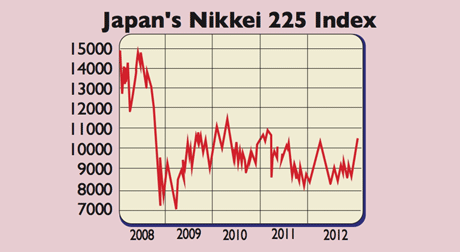
Japan’s Nikkei 225 index made a strong start to 2013, surging to a near two-year high. The index’s 23% gain in 2012 was its best performance since 2005. The yen has fallen to a two-year low of 86 to the US dollar.
The cause of all the excitement, the new prime minister Shinzo Abe, was sworn in last week. He has promised to push the Bank of Japan, using a change in the law governing its independence if need be, to adopt full-throttle money-printing.
This would weaken the yen, bolstering the profits of the exporters who dominate the stockmarket. The hope is that it will also boost stocks by ending deflation and galvanising growth.
What the commentators said
The bulls are out in force, with an average of seven forecasters polled by The Wall Street Journal pencilling in a 7% increase in the broad Topix index this year. Daiwa Securities reckoned the Nikkei could gain 25%. There is “considerable scope” for a weaker yen to juice stockmarket earnings, said Hiromichi Tamura of Nomura Securities.
Profits are still 40% below their pre-financial-crisis levels. A move to ¥90 per dollar implies a 30% annual rise in corporate earnings, he reckoned.
There is also still plenty of room for the stockmarket to keep making gains. “Strategists almost uniformly agree that Japanese shares remain undervalued and underexposed to international investors.” said Brad Frischkorn in The Wall Street Journal.
Kathy Matsui of Goldman Sachs, for example, pointed out that Japan is the only market where price-to-book ratios are still near 2008 crisis levels. Dividend yields are more than triple ten-year government bond yields. And with international funds having turned their back on Japan in recent years, the assault on the yen could pour tens of billions of dollars of international cash back into Japanese stocks. The Japanese stockmarket could finally be on the verge of unleashing its potential.